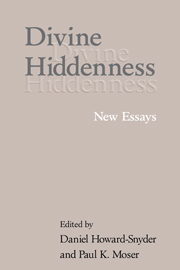Book contents
- Frontmatter
- Contents
- List of Contributors
- Introduction: The Hiddenness of God
- 1 What Is the Problem of the Hiddenness of God?
- 2 What the Hiddenness of God Reveals: A Collaborative Discussion
- 3 Deus Absconditus
- 4 St. John of the Cross and the Necessity of Divine Hiddenness
- 5 Jonathan Edwards and the Hiddenness of God
- 6 Cognitive Idolatry and Divine Hiding
- 7 Divine Hiddenness: What Is the Problem?
- 8 A Kierkegaardian View of Divine Hiddenness
- 9 The Hiddenness of God: A Puzzle or a Real Problem?
- 10 Seeking But Not Believing: Confessions of a Practicing Agnostic
- 11 The Silence of the God Who Speaks
- Bibliography
- Index of Names
- Index of Subjects
6 - Cognitive Idolatry and Divine Hiding
Published online by Cambridge University Press: 10 November 2009
- Frontmatter
- Contents
- List of Contributors
- Introduction: The Hiddenness of God
- 1 What Is the Problem of the Hiddenness of God?
- 2 What the Hiddenness of God Reveals: A Collaborative Discussion
- 3 Deus Absconditus
- 4 St. John of the Cross and the Necessity of Divine Hiddenness
- 5 Jonathan Edwards and the Hiddenness of God
- 6 Cognitive Idolatry and Divine Hiding
- 7 Divine Hiddenness: What Is the Problem?
- 8 A Kierkegaardian View of Divine Hiddenness
- 9 The Hiddenness of God: A Puzzle or a Real Problem?
- 10 Seeking But Not Believing: Confessions of a Practicing Agnostic
- 11 The Silence of the God Who Speaks
- Bibliography
- Index of Names
- Index of Subjects
Summary
Is there such a thing as Jewish-Christian philosophy? Probably. Or, at least, why not? Species of philosophy are pretty much a dime a dozen these days, and sometimes even that price is too high. Is there, however, a distinctively Jewish-Christian epistemology, or theory of knowledge? Now, that's a question whose answer does not come cheap. It concerns how, from a cognitive viewpoint, we properly relate to God, the Original Knower. The implications of this topic, we shall see, are profound indeed.
Questions about knowledge of God always hinge on questions about what kind of God we have in mind. The kind of God pertinent to a theistic epistemology makes all the difference in the world. Are we talking about the tenuous, domesticated God of deism, philosophical theism, or liberal Christianity? Or are we talking about the convicting, righteously loving God of Abraham, Isaac, Jacob, and Jesus? The latter is the gracious but elusive personal God who is a consuming fire against evil. This is also the God whose love for all requires divine suffering for us, even in the cross of God's Son, in order to remake us thoroughly in the divine image of holiness and self-giving love. In shying away from the latter robust conception of God, for the sake of a mere theism, philosophers and theologians neglect the distinctive epistemological resources of Jewish-Christian theism. They thereby miss the real point of knowledge of God. The result is an epistemology of theism that fails to challenge knowers in the way most needed: namely, in connection with human idolatry.
- Type
- Chapter
- Information
- Divine HiddennessNew Essays, pp. 120 - 148Publisher: Cambridge University PressPrint publication year: 2001
- 4
- Cited by

